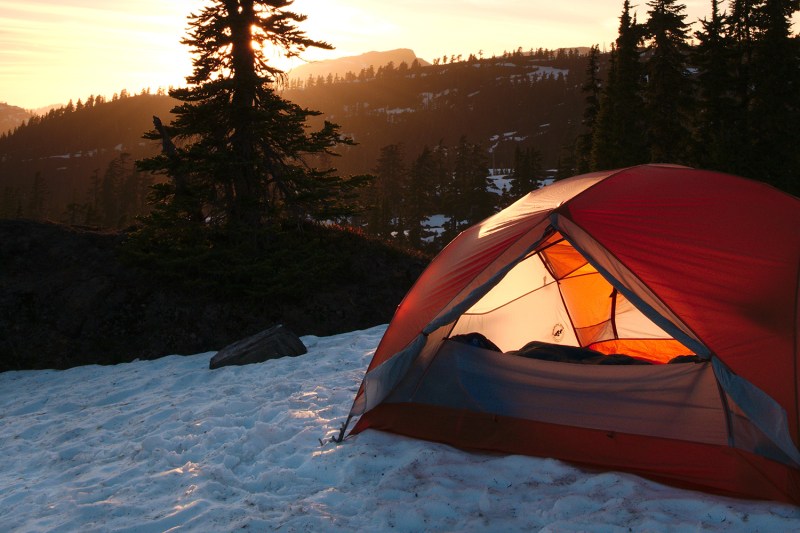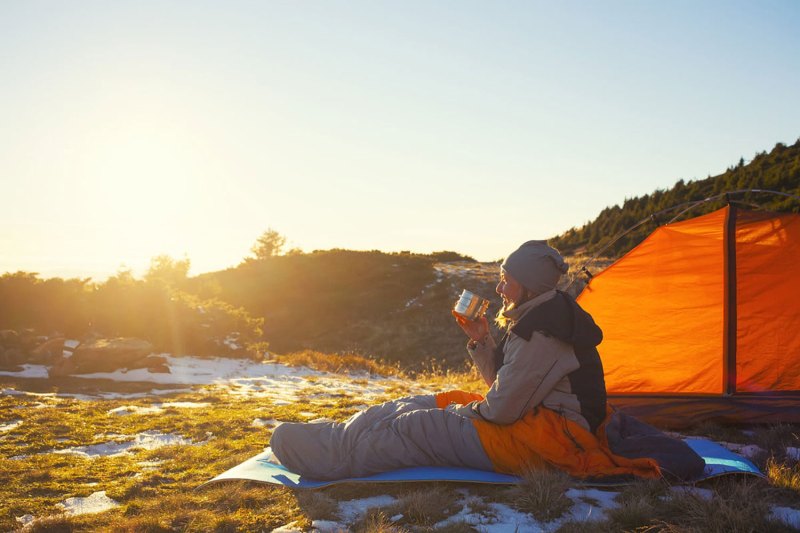If you’ve never experienced winter camping, then you may not know what you’re missing out on. Sure, summer camping is far more popular, but that’s half of what makes winter the perfect time to stay out under the stars. Quiet campsites, empty trails, and easy access to the golden hour — no four a.m. starts just to see the sunrise. Winter camping is special, but only if you’re fully prepared and know how to stay safe.
In the summer, a forgotten sleep pad, a stove that doesn’t work, or a dead set off headlamp batteries are irritating, but they’re more of a funny anecdote that you hope not to repeat. But in the winter, any one of these could be the start of the end — to your camping trip, hopefully, rather than you. Sub zero temperatures, long periods of darkness, and trails hidden with snow all make winter camping more challenging and more treacherous, so here are a few things you can do to stay safe this winter and still get out under the stars.

Load up with gear that you’ve practiced with
It goes without saying that winter camping comes with frigid conditions and long hours in the dark. In summer, you might be able to pack an ultralight backpack and hit the trail with your one-pound sleeping bag and a spare pair of socks. During winter, fast and light go out the window, and you become more of a packhorse than a stallion. It’s rare that you would head out on a winter camp or hike without a 50 L backpack or more.
Inside your backpack, you need to have a winter rated sleeping bag, four-season tent, sleeping pad, spare clothes, a food, stove, water, and lighting. As well as that, you should take a spare pair of thermal underwear and warm winter socks. If all else fails and you end up soaked through, you’ll at least have some dry items of clothing to put on as you climb into your sleeping bag for the night. We also recommend taking extra calories, as your body burns more food staying warm in the winter, as well as spare batteries and multiple different fire starters.
One top tip is to load up all of your gear compartmentally. Pack all of your items into smaller waterproof dry bags inside your backpack — one for your sleeping bag, one for your tent, spare clothing, etc. This keeps your gear completely dry and makes it much easier to find the right gear when you reach camp, rather than rummaging through your entire bag. And remember that winter is not a time to try out new gear. The time to find out how to put up your new four-season tent is at home, before your trip, not while you’re knee-deep in fresh snow with freezing-cold fingers.

Don’t forget these extras
It’s on you to pack the logical stuff you need, and that includes specialized gear like crampons for use on ice or snow and a pair of ski goggles to protect your eyes in biting winds. However, here are a few pieces of gear you might not have thought of if you normally camp during warm weather.
- Handwarmers: A good handwarmer can be absolutely invaluable. The best choice for winter is usually a traditional fuel-burning warmer made by Zippo or one of the many chemical reaction packets. There are also plenty of USB-powered electric hand warmers out there.
- Sun protection: Don’t forget sunscreen and lip balm. During winter, the sun hits the snow and reflects back up, meaning that the UV can get you from every direction.
- GPS: While they cost a good chunk of change, a GPS unit can save you hours of searching for your way when the path is covered by snow. One might just save your life when it prevents you from traveling the wrong way deeper into the hoary, frost-rimed hinterlands instead of trekking back toward your warm home and much-deserved glass of bourbon. Though a compass can help there, too, and for less cash.
- Shovel: Consider bringing along a compact shovel, which can move snow off the ground as you clear a campsite or build up a windbreak or an actual shelter. Shovels can also be used to dig out a fire pit or create a latrine.

Know your skills and stick within them
Sure, you’ve got to expand your horizons sometimes, but is the middle of winter really the time to do that? Unless you’re an experienced winter mountaineer, winter is a time to enjoy lower level camping in safe environments. Between the potential to get lost in a whiteout, find that your trail is knee deep in snow and nearly impossible to follow, and the risk of avalanches, there’s almost no end of potential hazards if you aren’t prepared.
Remember, too, that if you get lost, someone has to come and look for you. Do you really want to be risking the lives of rescue crews just to camp at the top of that ridge? Probably not. Winter is a great time to see familiar places in a different way. You can practise survival skills, test out that new gear — once you’ve tried it at home first — and find yourself a little solitude and peace. If you’re going to hit the trail, make sure you know how to navigate in variable and challenging conditions, and stick to well-worn paths rather than breaking trail on open hillside.

Have a plan and share it
Whether you’re heading out car camping or hiking a trail over multiple days, you need to have a plan in place for your
Once you have a route in mind, a campsite planned, and a timeframe for your trip, share it with at least one other person. Either email them, message them, or tell them — if you trust their memory — as many details of your plans as you can, and remember to include your ETA to be back at home or at your vehicle. If you don’t return, this person is responsible for contacting the authorities and beginning the search, so remember to contact them when you said you would. Plenty of search and rescue operations have found the ‘casualty’ alive, well, and sitting at the bar, having forgotten to phone home after a successful camping trip.
Editors' Recommendations
- Here’s why you need to take trekking poles on the trail
- The ultimate packing list for summer camping (so you’ll never forget a thing!)
- The worst camping mistakes we’ve made (so that you don’t have to)
- Stock your on-the-go outdoor kitchen with the best camping cookware
- Stock up on hiking and camping gear at the best places to shop for outdoor equipment deals




